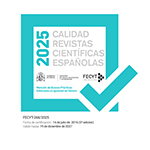A laissez-faire democracy. Employers’ intervention in the political system of the Spanish transition
Abstract
This article examines the intervention of the main Spanish business organizations, the Spanish Confederation of Employers’ Organizations (CEOE) and Fomento del Trabajo, in the political system of the Transition. The proposed outline begins with both the economic context —the end of the Thirty Glorious Years and boom of neoliberalism— and the political context —conservative counterrevolution— of the 70´s in the West, in order to study the ideological foundations that led Spanish organizations to interfere with the irregular financing of political parties and launching an underground scheme a covert plan to influence the vote towards the centre-right parties. To understand the characteristics of the network structure created to influence the vote in the electoral cycle of 1980-1982, as well as the responsibility of economic pressure groups in the crisis of the Governing party, the Union of the Democratic Centre (UCD), I have used some previously unpublished documentation: the personal records of Carlos Ferrer Salat, first president of the CEOE. In light of the objectives and results of this strategy, the article evaluates the success of an intervention that raises some doubts about its possible incompatibility with the principles of representativeness, participation, and transparency on which liberal democracies are built.
Downloads
Article download
License
Aquellos autores/as que tengan publicaciones con esta revista, aceptan los términos siguientes:
a. Los autores/as conservarán sus derechos de autor y garantizarán a la revista el derecho de primera publicación de su obra, el cuál estará simultáneamente sujeto a la Licencia de reconocimiento de Creative Commons Reconocimiento-No comercial-Sin obra derivada 4.0 España que permite a terceros compartir la obra siempre que se indique su autor y su primera publicación esta revista.
b. Los autores/as podrán adoptar otros acuerdos de licencia no exclusiva de distribución de la versión de la obra publicada (p. ej.: depositarla en un archivo telemático institucional o publicarla en un volumen monográfico) siempre que se indique la publicación inicial en esta revista.
Plagio y fraude científico
La publicación de un trabajo que atente contra los derechos de propiedad intelectual será responsabilidad de los autores/as, que serán los que asuman los conflictos que pudieran tener lugar por razones de derechos de autor. Los conflictos más importantes pueden darse por la comisión de plagios y fraudes científicos.
Se entiende por plagio:
1.Presentar el trabajo ajeno como propio.
2.Adoptar palabras o ideas de otros autores sin el debido reconocimiento.
3.No emplear las comillas u otro formato distintivo en una cita literal.
4.Dar información incorrecta sobre la verdadera fuente de una cita.
5.El parafraseo de una fuente sin mencionar la fuente.
6.El parafraseo abusivo, incluso si se menciona la fuente.
Las prácticas constitutivas de fraude científico son las siguientes:
1.Fabricación, falsificación u omisión de datos y plagio.
2.Publicación duplicada.
3.Conflictos de autoría.












